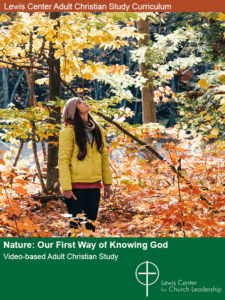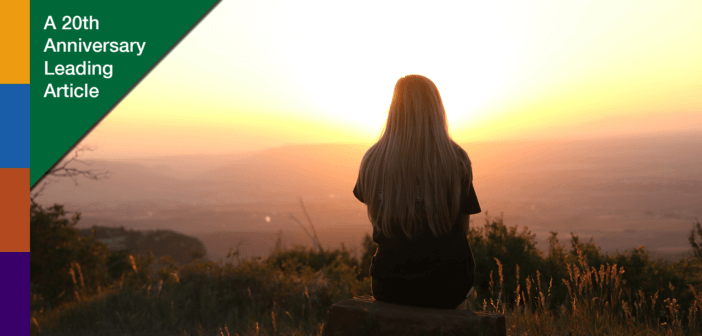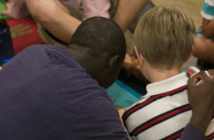The natural world is our first way of knowing God, says Beth Norcross, an expert in spirituality and nature. Finding God in nature can reconnect people with faith and the biblical tradition, especially the growing percentage of younger people who are less attracted by the trappings of the institutional church.
To celebrate the Lewis Center’s anniversary, we are highlighting Leading Articles — some of our most popular posts of the past 20 years. We are pleased to share again this article by Beth Norcross, originally published on March 23, 2021.
It seems like everyone’s outside these days. Despite COVID-19-related travel restrictions and safety concerns, parks and natural areas are packed. The Shenandoah National Park, for example, reported that visitation last year was up 50 percent from the same time the previous year. What’s going on?
Doctors of all stripes, particularly mental health practitioners, have been extolling the virtues of the outdoors for some time now. Studies show that when we are in nature, our blood pressure lowers; our perspective broadens; we are calmer there, and kinder, too. We experience what Wendell Berry calls “the peace of wild things.”
The natural world is part of our biological and spiritual DNA.
Perhaps, these feelings are evoked because the natural world is actually in our DNA. We share 90 percent of our DNA with a chimp, 65 percent with a chicken and even 47 percent with a fruit fly! We share a physical kinship with every plant and tree and insect and animal on the planet. Is it any wonder we feel more connected when we are in nature?
There’s even more to it, though. Not only is nature part of our biological DNA, it is in our spiritual DNA as well. Long before there were synagogues and mosques and churches, our first way of experiencing or knowing God was outdoors — in the fig tree, the burning bush, living waters. And Jesus often used familiar nature imagery to get his point across to the people of his time, who lived in close proximity to, and intimacy with, the nonhuman natural world.
Nature Is a place of spiritual connection.
Increasingly, people are finding nature to be that place where they find spiritual foundation and sustenance. The Pew Research Center’s recent Religious Landscape Study shows a distinct rise of the “nones” — those individuals that have no religious affiliation, over one-third of whom are under 30. At the same time, people are flocking to nature. In nature, that experience of Spirit is unmediated and unfettered, uncomplicated by dogma and doctrine. In the tiny pink buds of the Virginia bluebells, we experience directly the immanence of God’s presence. In the vastness of the Atlantic Ocean, we know viscerally an awesome, transcendent God.
Importantly, too, in nature, we can bring our most difficult challenges and our deepest sorrows. Simply put, nature is not a walk in the park. Violence lies at the heart of natural systems. Pain and grief and death are real. One need only witness an eagle grab a baby osprey out of its nest to see that violence firsthand. And yet when we view the eagle feed its prey to her chicks, we can experience how entangled death and life are. In nature, renewal and resilience and transformation are real, too.
We live in a time of extraordinary planetary challenge. We are already feeling its effects in higher temperatures, extreme weather events, and accelerated species extinction. The uncertainty, anxiety, guilt, and fear in living in an increasingly precarious environment can be overwhelming. Spending time with God in and through nature can bring fresh understanding of these challenges and offer new connections and a different way of relating to Earth that could be our best hope of transforming our lives and lifestyles to live in harmony and wholeness with the creation.
How can you help people know God in nature?
The imperative for engaging the natural world is found in Scripture. The creation stories, God’s provision for all creatures, and thanksgiving for that provision, are at the heart of the Biblical narrative. In Scripture, we discover the significant role that water plays in spirituality. We experience the connections between what the Bible says about compassion, death, and grief and the wisdom that nature offers. We also experience firsthand how resurrection and renewal are at the heart of natural systems and how they invite us to connect and respond.
In this time when so many people are seeking restoration and renewal and when younger generations are less and less connected to the trappings of the institutional church, helping people find God in nature is a meaningful way to connect them with faith. It is a time for congregations and faith leaders to rediscover how the natural world reveals the truths of the Christian faith.
 Beth Norcross has partnered with the Lewis Center to develop a seven-part video learning curriculum, Nature: Our First Way of Knowing God. The videos and study guide offer very specific nature-based spiritual practices that explore the significant connection we can make with God and the Christian faith through intentional time in the natural world.
Beth Norcross has partnered with the Lewis Center to develop a seven-part video learning curriculum, Nature: Our First Way of Knowing God. The videos and study guide offer very specific nature-based spiritual practices that explore the significant connection we can make with God and the Christian faith through intentional time in the natural world.
Related Resources
- Discovering God in Nature featuring Beth Norcross — Leading Ideas Talks podcast episode | Transcript
- Networks and Third Places are Today’s Mission Field by Ken Carter and Audrey Warren






